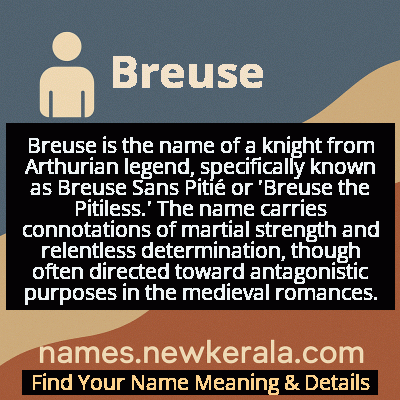Breuse Name Meaning & Details
Origin, Popularity, Numerology Analysis & Name Meaning of Breuse
Discover the origin, meaning, and cultural significance of the name BREUSE. Delve into its historical roots and explore the lasting impact it has had on communities and traditions.
Name
Breuse
Gender
Male
Origin
Arthurian
Lucky Number
7
Meaning of the Name - Breuse
Breuse is the name of a knight from Arthurian legend, specifically known as Breuse Sans Pitié or 'Breuse the Pitiless.' The name carries connotations of martial strength and relentless determination, though often directed toward antagonistic purposes in the medieval romances.
Breuse - Complete Numerology Analysis
Your Numerology Number
Based on Pythagorean Numerology System
Ruling Planet
Neptune (Ketu)
Positive Nature
Intuitive, analytical, spiritual, and inquisitive.
Negative Traits
Secretive, reserved, aloof, and can be overly critical.
Lucky Colours
Green, yellow.
Lucky Days
Monday.
Lucky Stones
Cat’s eye, moonstone.
Harmony Numbers
1, 5, 6.
Best Suited Professions
Scientists, researchers, spiritual leaders, detectives.
What People Like About You
Depth of knowledge, analytical skills, spirituality.
Famous People Named Breuse
Breuse Sans Pitié
Arthurian Knight
Notorious villain knight known for his cruelty and frequent battles against Sir Gawain
Breuse the Pitiless
Literary Character
Primary antagonist in Thomas Malory's Le Morte d'Arthur
Breuse Sans Pitié
Mythological Figure
Archetype of the unchivalrous knight in Arthurian tradition
Name Variations & International Equivalents
Click on blue names to explore their detailed meanings. Gray names with will be available soon.
Cultural & Historical Significance
In the broader context of medieval literature and cultural values, Breuse embodies the tension between raw martial prowess and ethical conduct. He serves as a cautionary figure about the dangers of power without principle, reflecting medieval concerns about the proper use of knightly violence and the importance of moral restraint. The persistence of his character across multiple Arthurian texts indicates how essential such antagonist figures were to the narrative structure of chivalric romance, providing the necessary challenges through which true heroes could demonstrate their virtue and worth. Breuse's cultural significance extends beyond mere villainy to represent fundamental questions about the nature of honor, the purpose of strength, and the relationship between power and responsibility in the medieval worldview.
Extended Personality Analysis
The name Breuse is strongly associated with a personality marked by aggression, determination, and a notable lack of mercy. Characters bearing this name in Arthurian tradition typically exhibit fierce combativeness, unwavering persistence in pursuit of their goals, and a willingness to employ ruthless tactics. These individuals often possess formidable physical strength and military skill but are characterized by their moral flexibility and refusal to adhere to conventional codes of honor. The Breuse archetype suggests someone driven by intense pride and competitive spirit, capable of remarkable resilience but often directing these qualities toward destructive or antagonistic ends.
Beyond the surface-level characterization as a villain, the personality associated with Breuse reveals deeper psychological dimensions. There is often a sense of operating by one's own internal code rather than external societal norms, suggesting independence of thought and action that can manifest as either admirable self-determination or dangerous rebellion. The persistence for which Breuse is known indicates tremendous willpower and refusal to accept defeat—qualities that, in different contexts, could be channeled toward positive achievements. However, the dominant personality traits remain those of confrontation, challenge, and opposition, making Breuse-associated characters natural antagonists who thrive on conflict and testing their strength against worthy opponents. This creates a complex personality profile where strength and determination exist alongside moral ambiguity and conflict-driven behavior.
Modern Usage & Popularity
In contemporary naming practices, Breuse remains an exceptionally rare choice, primarily confined to Arthurian enthusiasts, historical fiction authors, and parents seeking highly distinctive names with strong literary connections. The name has never achieved mainstream popularity and does not appear in modern baby name databases or popularity charts. Its usage is almost exclusively limited to English-speaking countries with established Arthurian literary traditions, particularly the United Kingdom, United States, and Canada. Modern bearers of the name typically encounter frequent questions about its origin and pronunciation, though this very distinctiveness appeals to those seeking names with clear historical and narrative resonance. The name's strong association with a villain character from Arthurian legend somewhat limits its appeal, though some modern parents may appreciate the name's uniqueness and medieval authenticity despite its negative literary connotations. The name's rarity ensures that any modern usage is almost certainly a conscious literary reference rather than a random selection.
Symbolic & Spiritual Meanings
Symbolically, the name Breuse represents the shadow aspect of knighthood and the complex relationship between strength, honor, and moral responsibility. It embodies the archetype of martial prowess divorced from ethical restraint—the skilled warrior who lacks the moral compass to direct his abilities toward virtuous ends. The name carries connotations of persistence and determination taken to destructive extremes, where the refusal to surrender becomes stubbornness and the will to win transforms into ruthlessness. In the broader symbolic framework of Arthurian legend, Breuse serves as the necessary antagonist whose opposition helps define and refine the virtues of the heroes, making him integral to the moral education that these stories represent.
Metaphorically, Breuse symbolizes the dangers of talent without direction and power without purpose. He represents the individual who possesses all the external qualities of success—strength, skill, determination—but lacks the internal guidance to use these qualities constructively. The name also carries symbolic weight as representing the testing ground for true virtue, since heroes must repeatedly overcome Breuse's challenges to prove their worth. In a modern psychological context, Breuse could symbolize the shadow self—the aspects of personality that society deems unacceptable but which nevertheless contain potent energy and capability that, if properly integrated and directed, could contribute to wholeness and effectiveness.

